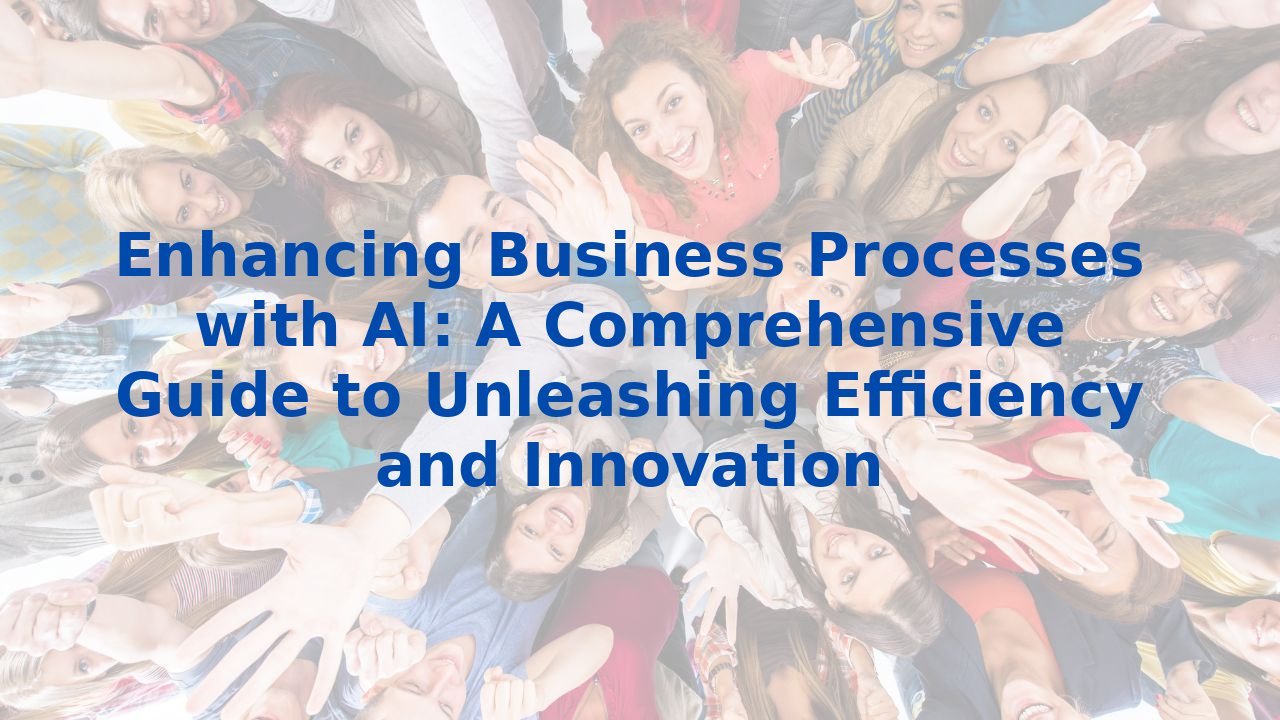Enhancing Business Processes with AI: A Comprehensive Guide to Unleashing Efficiency and Innovation
Enhancing Business Processes with AI: A Comprehensive Guide to Unleashing Efficiency and Innovation
In a world where the pace of business is accelerating, organizations are under immense pressure to boost efficiency and optimize operations. Enter Artificial Intelligence (AI) — a transformative force that promises to deliver unprecedented operational improvements. This guide dives into the fundamentals of Business Process Management (BPM) and explores how incorporating AI can enhance each component of this critical discipline, ultimately leading to enhanced innovation and performance.
Understanding Business Process Management (BPM)
BPM is the backbone of effective organizational governance. It's about analyzing, designing, executing, and continuously improving business processes to achieve defined goals. While BPM as a discipline has evolved since the 1980s, its core purpose remains the same: to enhance efficiency, productivity, and quality in business operations.
Enhancing BPM with AI
Integrating AI into BPM offers a variety of innovative advantages. Here’s a closer look at how AI can enhance critical aspects of process management:
“The future of business lies not just in automating what's already there but in reimagining how we conduct every facet of operations.”
Process Discovery
AI’s capability for process mining, pattern recognition, and natural language processing aids organizations in uncovering existing processes that may be hindering efficiency. By tapping into these algorithms, businesses can identify inefficiencies and bottlenecks that traditional analysis might overlook. The revelations gained here serve as the bedrock for informed improvements.
Process Mapping
With AI, real-time data analysis can produce accurate process maps, ensuring that the documentation reflects the current state of operations. This enables organizations to visualize workflow frameworks and pinpoint optimization opportunities that might lead to dramatic improvements in performance.
Process Automation
Imagine a world where mundane tasks are delegated to intelligent bots. From handling customer service inquiries to processing data, AI facilitates automation of repetitive tasks, offering organizations the luxury of focusing on strategic initiatives. This not only expedites operations but also enhances accuracy, allowing human resources to invest time in creative problem-solving instead of rote duties.
Process Improvement
AI’s data-driven insights are game-changers in driving sustainable improvements. The technology can analyze historical data patterns and trends, helping businesses predict future outcomes. This predictive capability allows for proactive decision-making — a significant leap from reactive strategies that often lead to missed opportunities.
Benefits of AI in BPM
The advantages of integrating AI into BPM are nothing short of transformative:
- Improved Efficiency: By automating routine tasks, AI minimizes the manual effort needed in day-to-day operations. This translates directly into time savings and the reallocation of human resources toward creativity and strategic initiatives.
- Enhanced Decision-Making: Equipped with predictive insights, teams can make informed choices swiftly. The ability to discern trends and outcomes leads to more effective and timely business tactics.
- Real-Time Monitoring: AI technologies empower businesses with real-time updates, enabling immediate interventions when problems arise or when opportunities surface. This agility can make all the difference in today’s fast-paced environment.
The Role of AI in Process Optimization
On the frontier of process optimization, AI harnesses machine learning to enhance BPM comprehensively. Key areas of focus include:
- Automating Routine Tasks: AI tackles repetitive duties like data collection and invoice processing, freeing employees to engage in more strategic, high-impact activities.
- Optimizing Resource Allocation: Leveraging AI insights to evaluate stock levels and sales forecasts leads to more intelligent resource distribution, aligned with market demands.
- Speeding Up Planning and Research: AI can reduce the time required for documents and correspondence analysis, facilitating quicker decision-making cycles.
The Importance of Employee Training for AI
While AI can revolutionize BPM, its integration demands a well-trained workforce. Here’s why investing in human capital is critical:
- Understanding AI Capabilities: Employees must grasp the breadth of AI’s capabilities and limitations. They should feel empowered to know when human insight is essential, helping maintain a balanced Human-AI relationship.
- Adapting to AI-Driven Processes: Embracing AI is not merely technological; it’s a cultural shift. Adequate training allows employees to navigate and collaborate within AI-enhanced workflows.
- Collaborating with AI Systems: The synergy between human intuition and AI capability can unlock unique innovations. Training prepares teams for seamless collaboration with these advanced tools, maximizing their output.
Conclusion
Integrating AI within BPM stands to provide a plethora of benefits, including improved efficiency, enhanced strategic decision-making, and effective process monitoring. However, to truly harness AI’s power, organizations must prioritize employee training. Those who invest in cultivating understanding surrounding AI capabilities will not only enhance operational efficiency but also position themselves as innovators in a rapidly changing landscape.
Explore more about training your workforce for the AI landscape by visiting our About Us page, where we delve into the optimal approach for equipping teams with essential skills.



